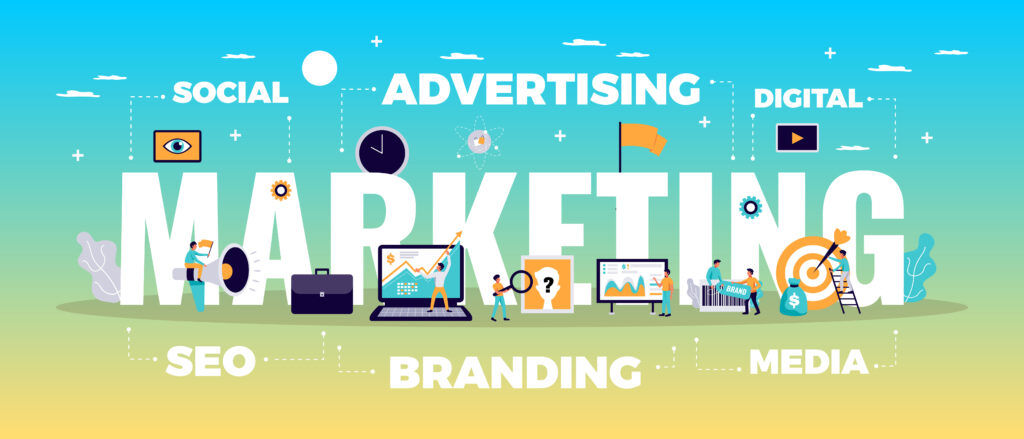In today’s digital landscape, it’s no secret that artificial intelligence (AI) is revolutionizing the way we do business. From chatbots that provide instant customer support to personalized recommendation engines, AI is transforming digital marketing as we know it. The future of digital marketing lies in harnessing the power of AI to deliver targeted, relevant, and personalized experiences to consumers.
With AI-powered technologies, brands can analyze vast amounts of data to gain valuable insights into customer behavior and preferences. By understanding what drives their audience, marketers can create more impactful campaigns that resonate with their target audience. AI also enables hyper-targeted advertising, ensuring that the right message reaches the right person at the right time. This level of personalization not only enhances the customer experience but also improves the overall effectiveness of marketing efforts.
As AI continues to advance, the possibilities for digital marketing are limitless. With automation, predictive analytics, and machine learning, brands can optimize their marketing strategies, increase conversion rates, and stay ahead in an ever-competitive landscape. The future is here, and it’s powered by AI. Get ready to embrace the potential and transform your digital marketing efforts.
Benefits of Using Artificial Intelligence in Digital Marketing
The benefits of incorporating artificial intelligence (AI) into digital marketing strategies are manifold, offering brands a competitive advantage in a crowded marketplace. One key advantage of AI is its ability to automate repetitive tasks, freeing up valuable time and resources for marketers to focus on strategic initiatives. By automating processes such as data analysis, content creation, and campaign optimization, AI enables marketers to work more efficiently and effectively, leading to improved productivity and ROI.
Furthermore, AI empowers marketers to deliver personalized and targeted experiences to consumers at scale. Through advanced algorithms and predictive analytics, brands can segment their audiences based on behavior, preferences, and demographics, allowing for highly tailored messaging and content delivery. This level of personalization not only enhances the overall customer experience but also drives higher engagement, conversion rates, and brand loyalty. AI also enables real-time optimization, ensuring that marketing campaigns are always relevant and impactful.
Another key benefit of AI in digital marketing is its ability to analyze vast amounts of data in real-time, providing marketers with actionable insights and intelligence. By leveraging AI-powered tools and technologies, brands can gain a deeper understanding of their audience, market trends, and competitive landscape, allowing for data-driven decision-making and strategic planning. This data-driven approach enables marketers to identify opportunities, mitigate risks, and adapt their strategies in response to changing market dynamics, ultimately driving business growth and success.
Current Trends and Statistics in AI-Driven Digital Marketing
The landscape of digital marketing is constantly evolving, driven by advancements in artificial intelligence (AI) technologies that are reshaping the way brands engage with consumers. According to recent trends and statistics, AI is playing an increasingly pivotal role in digital marketing strategies, with a growing number of businesses investing in AI-powered tools and solutions to drive growth and innovation. In fact, studies show that AI adoption in marketing is on the rise, with a significant percentage of marketers citing AI as a top priority for their organizations.
One key trend in AI-driven digital marketing is the focus on personalization and targeting, with brands leveraging AI algorithms to deliver hyper-personalized content and experiences to consumers. By analyzing customer data and behavior, AI enables marketers to create tailored messaging that resonates with individual preferences and needs, driving higher engagement and conversion rates. This level of personalization not only enhances the customer experience but also builds brand loyalty and advocacy.
Another emerging trend in AI-driven digital marketing is the use of chatbots and virtual assistants to enhance customer service and engagement. AI-powered chatbots are becoming increasingly sophisticated, offering personalized recommendations, answering customer queries, and providing real-time support across various touchpoints. These intelligent bots not only streamline customer interactions but also improve response times, efficiency, and satisfaction levels. As consumers continue to seek instant gratification and seamless experiences, AI-powered chatbots are proving to be invaluable assets for brands.
Implementing AI in Digital Marketing Strategies
Implementing artificial intelligence (AI) into digital marketing strategies requires a strategic approach and a deep understanding of how AI technologies can be leveraged to drive business outcomes. To successfully integrate AI into marketing efforts, brands must first identify their objectives, target audience, and key performance indicators (KPIs) to ensure alignment with business goals. By defining clear objectives and metrics, marketers can measure the impact of AI initiatives and make data-driven decisions to optimize performance.
One key step in implementing AI in digital marketing strategies is to assess the existing technology stack and identify areas where AI can add value. Whether it’s automating routine tasks, analyzing customer data, or optimizing ad campaigns, AI can enhance various aspects of the marketing workflow to drive efficiency and effectiveness. By conducting a thorough audit of current processes and technologies, brands can pinpoint opportunities for AI integration and prioritize initiatives based on impact and feasibility.
Collaboration and cross-functional alignment are also essential when implementing AI in digital marketing strategies. Marketers must work closely with IT, data science, and other relevant teams to ensure seamless integration of AI tools and technologies into existing systems and processes. By fostering a culture of collaboration and knowledge-sharing, brands can maximize the value of AI investments and drive innovation across the organization. Additionally, ongoing training and upskilling programs are essential to empower marketers with the skills and knowledge needed to leverage AI effectively.
AI Tools for Digital Marketing Automation
Artificial intelligence (AI) tools are revolutionizing digital marketing automation, enabling brands to streamline processes, optimize campaigns, and drive better results. From predictive analytics to machine learning algorithms, AI-powered tools offer a range of capabilities that empower marketers to work more efficiently and effectively. One key benefit of AI tools is their ability to automate repetitive tasks, such as data analysis, content creation, and campaign optimization, saving marketers time and resources while improving productivity and ROI.
One popular AI tool for digital marketing automation is marketing automation software, which uses AI algorithms to automate various marketing tasks, such as lead nurturing, email marketing, and customer segmentation. By leveraging AI-powered automation tools, marketers can deliver personalized content, track customer interactions, and optimize campaigns based on real-time data and insights. This level of automation not only improves efficiency but also enhances the overall customer experience, driving higher engagement and conversion rates.
Another essential AI tool for digital marketing automation is chatbots, which use natural language processing (NLP) algorithms to interact with customers, answer queries, and provide personalized recommendations. AI-powered chatbots enable brands to deliver instant customer support, resolve issues in real-time, and enhance the customer experience across various touchpoints. By automating customer service interactions, brands can improve response times, reduce costs, and increase customer satisfaction levels, ultimately driving loyalty and advocacy.
Personalization and Targeting with AI in Digital Marketing
Personalization and targeting are key pillars of successful digital marketing strategies, and artificial intelligence (AI) is playing a pivotal role in enabling brands to deliver highly personalized experiences to consumers. By leveraging AI algorithms and predictive analytics, marketers can segment their audiences based on behavior, preferences, and demographics, allowing for tailored messaging and content delivery. This level of personalization not only enhances the customer experience but also drives higher engagement, conversion rates, and brand loyalty.
One key benefit of personalization with AI is the ability to deliver hyper-targeted content and offers to consumers, based on their individual preferences and needs. By analyzing customer data and behavior in real-time, AI-powered systems can generate personalized recommendations, product suggestions, and promotional messages that resonate with each individual, increasing the likelihood of conversion and retention. This level of customization not only boosts sales but also strengthens brand affinity and customer relationships.
Moreover, AI enables marketers to create dynamic, adaptive campaigns that evolve in response to customer interactions and feedback. By leveraging machine learning algorithms, brands can optimize their messaging, creative assets, and targeting parameters based on real-time data, ensuring that campaigns are always relevant and impactful. This level of agility and responsiveness is crucial in today’s fast-paced digital landscape, where brands must stay ahead of the curve to remain competitive and drive business growth.
AI Chatbots and Customer Service in Digital Marketing
AI-powered chatbots are transforming the landscape of customer service in digital marketing, offering brands a scalable and efficient way to engage with consumers and deliver instant support. These intelligent bots use natural language processing (NLP) algorithms to understand customer queries, provide relevant information, and resolve issues in real-time, across various digital touchpoints. By automating customer interactions, AI chatbots streamline the customer service process, improving response times, efficiency, and satisfaction levels.
One key benefit of AI chatbots in digital marketing is their ability to deliver personalized recommendations and suggestions to consumers, based on their preferences and past interactions. By analyzing customer data and behavior patterns, chatbots can generate tailored responses, product recommendations, and promotional offers that resonate with individual needs, driving higher engagement and conversion rates. This level of personalization not only enhances the customer experience but also builds brand loyalty and advocacy.
Moreover, AI chatbots enable brands to provide 24/7 support, instant responses, and seamless experiences to consumers, regardless of the time or channel. By automating routine queries and tasks, chatbots free up valuable resources for human agents to focus on more complex issues and strategic initiatives. This level of automation not only improves operational efficiency but also enhances the overall customer experience, driving loyalty, satisfaction, and long-term relationships with consumers.
Challenges and Ethical Considerations in AI-Driven Digital Marketing
While artificial intelligence (AI) offers significant benefits and opportunities for digital marketing, it also presents challenges and ethical considerations that must be addressed to ensure responsible and sustainable use. One key challenge is the potential for bias in AI algorithms, which can lead to discriminatory outcomes and unfair treatment of certain groups. To mitigate bias, marketers must ensure that AI systems are trained on diverse and representative data sets, and regularly monitored and audited for fairness and transparency.
Another challenge in AI-driven digital marketing is data privacy and security, as AI technologies rely on vast amounts of consumer data to function effectively. Marketers must prioritize data protection, compliance, and transparency to build trust with consumers and adhere to regulatory requirements. By implementing robust data governance practices, encryption protocols, and user consent mechanisms, brands can safeguard customer information and minimize the risk of data breaches or misuse.
Ethical considerations also come into play when using AI in digital marketing, particularly in areas such as data collection, targeting, and personalization. Marketers must be transparent about how AI technologies are used to collect and analyze customer data, and provide clear opt-in/opt-out mechanisms for consumers to control their privacy preferences. By prioritizing ethical practices and consumer trust, brands can build strong relationships with their audiences and differentiate themselves in a crowded marketplace.
In conclusion, the future of digital marketing is undeniably intertwined with artificial intelligence (AI), as brands continue to harness the power of AI technologies to drive innovation, efficiency, and growth. By leveraging AI tools for automation, personalization, and targeting, marketers can create more impactful campaigns, engage with consumers on a deeper level, and drive tangible results. As AI continues to evolve and advance, the possibilities for digital marketing are limitless, offering brands new opportunities to optimize their strategies, increase conversion rates, and stay ahead of the competition.
For more posts please visit: https://digitalwithgovind.com/blog/

